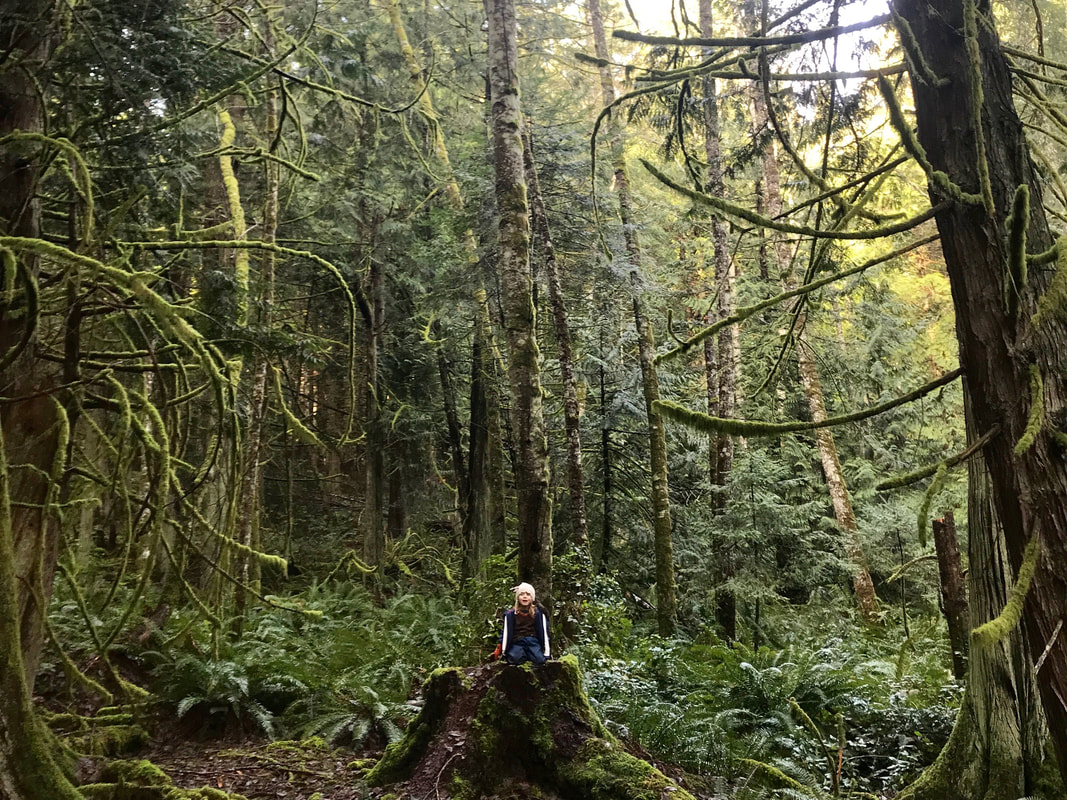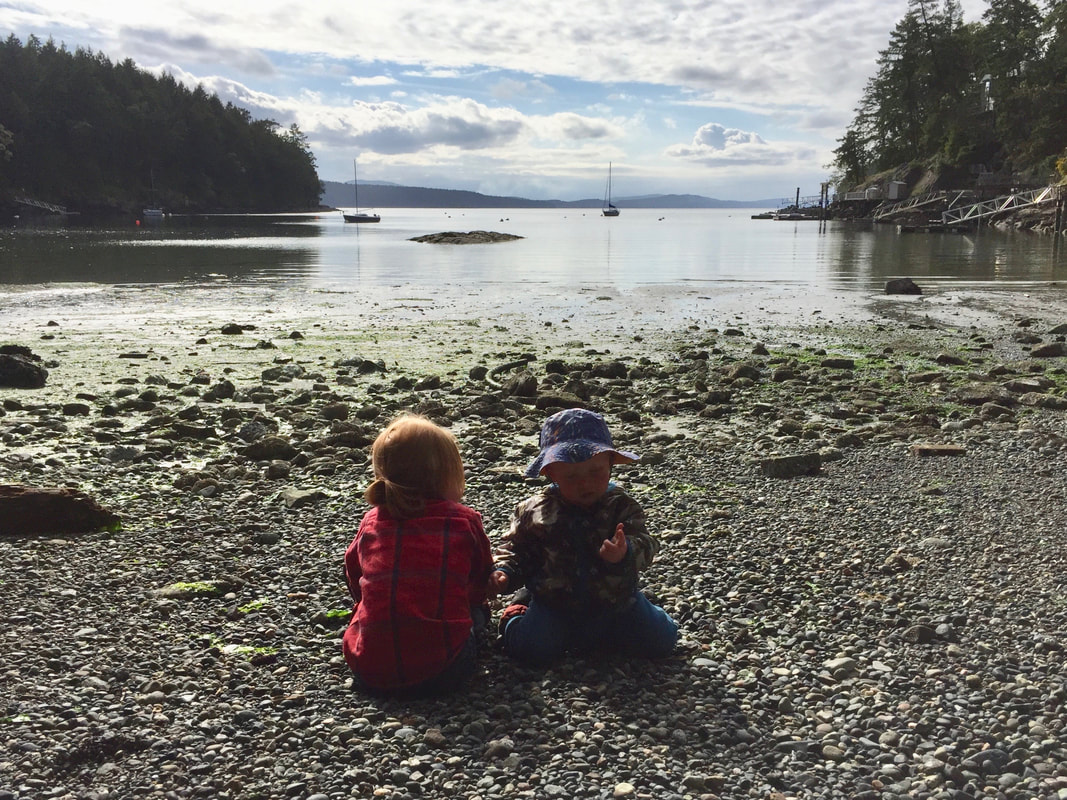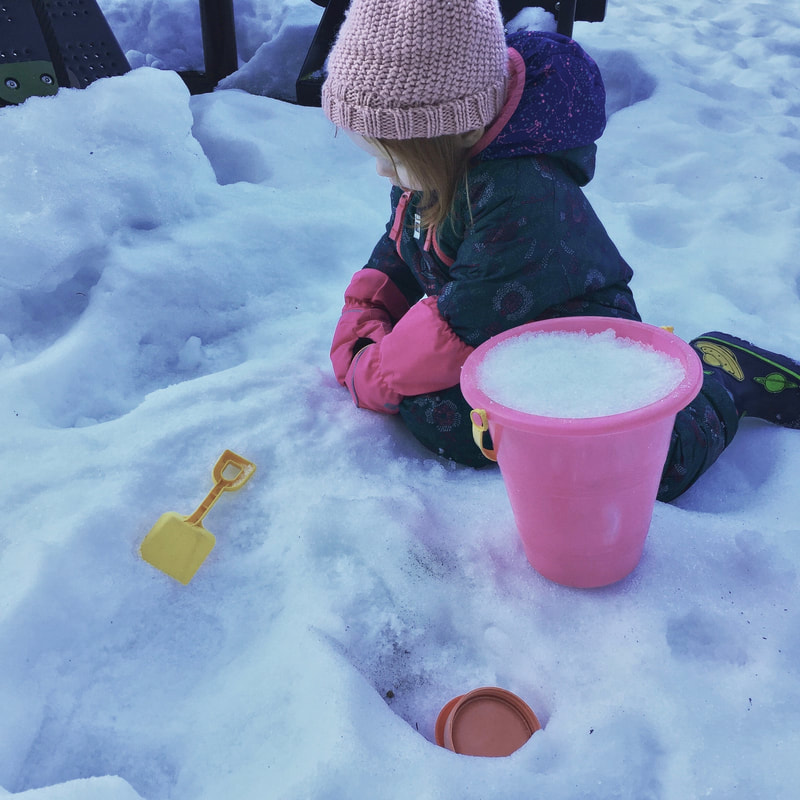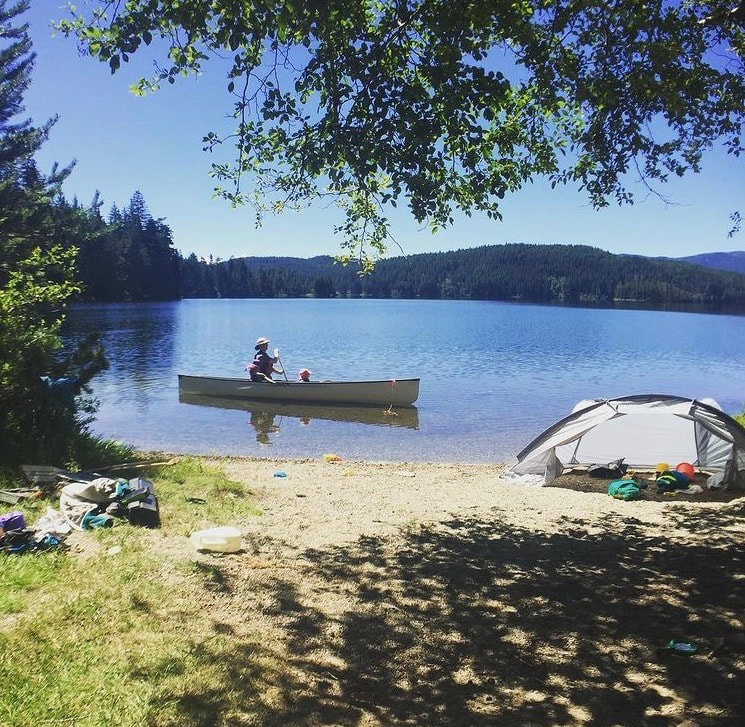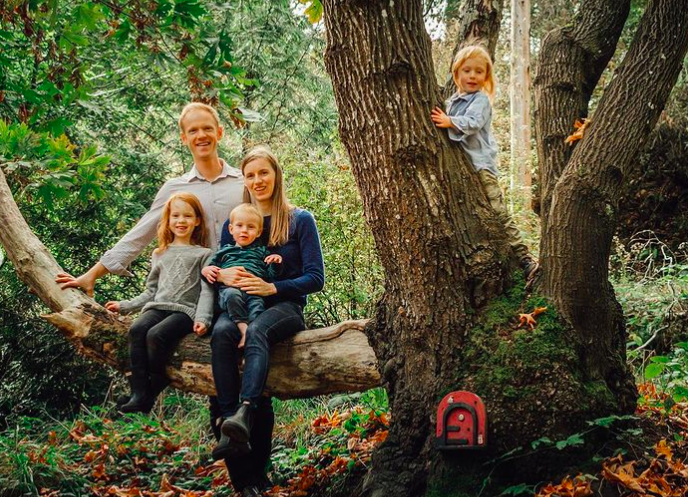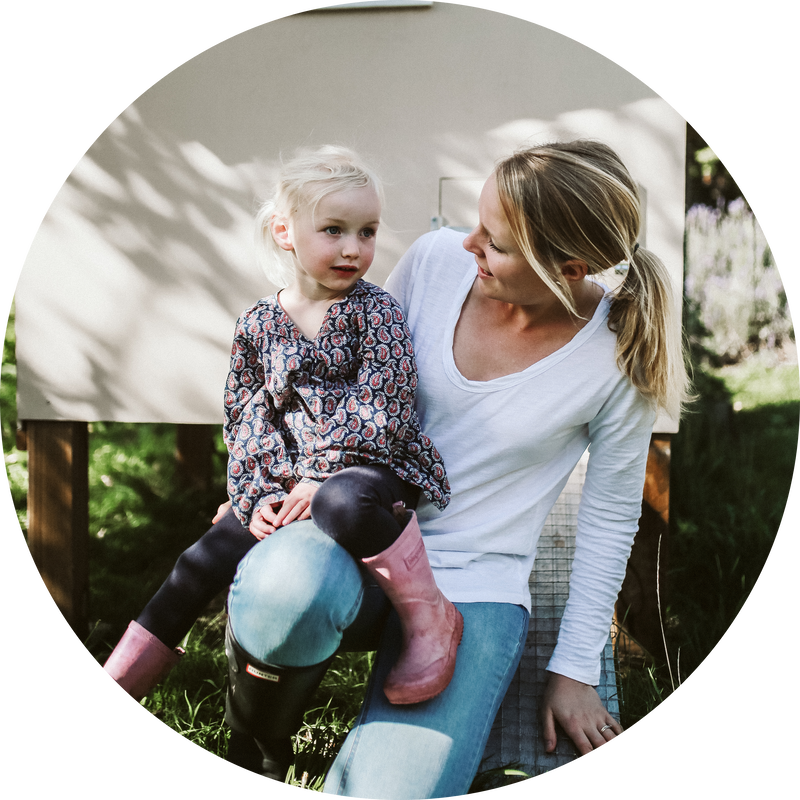|
Karen Begley lives on Mayne Island, Canada with her husband Tim, daughter Olivia and sons Cameron and Gavin. Last year Karen and her family spent 1268 hours outside, in this interview Karen shares a little about what they learnt during their year outdoors. Tell us a little about where you live. We live on a tiny rural island, between Victoria and Vancouver. The land we live on the unceded territory of the Coast Salish Peoples, particularly the Hul’q'umi’num' speaking people. My husband Tim is a kinesiologist, he works remotely, mostly online. I’m a teacher and I work with teachers wanting to incorporate outdoor learning and the ideas of the Reggio Emilia Approach into their practice . Tell us about your goal for last year. We’d decided to make the goal to get outside for 1000 hours in the year. I wanted to focus on it for a year, on that relationship between us and the earth. We played outside a lot but we also dug deeper into the work of Indigenous authors and the knowledge and activism that go along with that. We grew the biggest garden we ever have, we travelled, adventured and explored. You're a busy Mum with three kids and a side-hustle, how do you find time to get outside? This is such a great question. When I hear others talk about this it's quite common for people to say, 'forget the housework.' But I don't think that works for everyone. Seeing piles of washing or dishes banking up makes some of us stressed. So while it’s easy to say ‘just let the tidying go,’ that doesn’t always work. I think you have to figure out what your priorities are and let go of the rest. Maybe you can send them out safely in the yard to play while you wash up. For us, something we took off the list was school. We’ve chosen to homeschool and that has taken the drop-offs, the packed lunches and the school events off the list. I think it also helps to remember, nature play doesn’t have to be a big event. It doesn’t need to be the beautiful mud kitchen. It doesn’t need to be the hike up a mountain. It can be little things—just taking a book outside and reading it, or drawing on the pavement with chalk. What advice do you have about getting outside with a baby? Babies will sleep outside, they will feed outside, they will play outside. They are part of the natural world, they will know what to do outside. It’s a natural place for them. When they’re tiny it might just be putting them in a stroller or wearing them in a carrier. However, my advice is that you remove all expectation. I track my hours, I enjoy tracking my hours, I find it motivating. But when you have a baby, I don’t recommend making a goal of a certain number of hours, or a certain number of hours per day. Last year my goal was for us to be outside intentionally every single day. And that might be thirty seconds. Because it might be the kind of day that when you finally get outside, someone slips in a puddle and needs to go back in. I never want to feel resentful of my children, I want to feel present and happy. So I make plans, but I don’t hold us to too many expectations. Especially when they are babies. Sometimes it’s just let’s sit on the front steps together for five minutes. What about snacks, what are you packing in your picnic basket? We keep it very simple. We’re a gluten-free family so we eat rice cakes with peanut butter and locally grown apples. Also, homemade granola bars. How do you do outdoor play when it’s cold? The winters in our part of Canada are not nearly as cold as what you imagine. We get only a little snow for three or four days. But, we do get a lot of rain and a lot of cloudy days. In my first year of teaching, we kept a weather calendar and that year we counted thirty-five days without any sunlight, not any. We get this thick layer of grey cloud and it just sticks around. The kids stop drawing blue skies in their pictures. That’s winter here. It’s wet and dark and grey all the time. So to survive it we take vitamin D supplements. We do our best to try and get outside a little every day. I find we are happiest if we go in the morning. Unless it’s really wet in the morning, then we’ll plan an afternoon trip. When it’s cold and wet it’s so important to have good comfortable gear for you and your children. I ask for warm gear for my birthday and I’ve slowly built up more and more gear over the years. It doesn’t have to be fancy. It doesn’t have to be new, expensive or brand name. But it is important that everyone feels warm, dry and comfortable—as much as possible. We don’t try and avoid the rain, because we want to value it. It’s part of nature, it’s my neighbour. I share this land with the rain, we depend on it. So we put on our waterproof gear, and our warm clothes and everyone has rubber boots that fit, and we go out in it. Those wet days are not the days we’re going to be out all day. But my kids love playing in the rain, we jump in puddles, look for worms, listen to the the rain. We collect the water to play in and water our garden with. We just try to embrace it. What does play look like at your place when you are inside? We are very influenced by the Reggio Emilia approach to early education. So we embrace open-ended toys like wooden blocks. We encourage our children to ask questions, build theories, test things out and try things. We do also lot of art. We love watercolour painting. I believe painting is such a hugely beneficial activity for our children. The language of painting comes naturally to young children, it flows, it moves, it’s dynamic. We also make play dough together and clean it up together too. There is nothing I am preparing ahead of time. 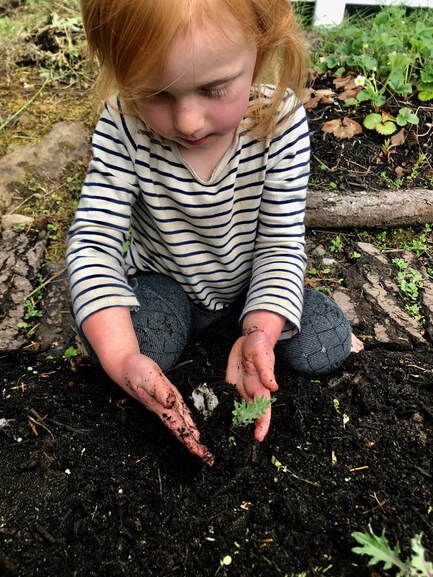 'We don’t try and avoid the rain, because we want to value it. It’s part of nature... we depend on it.' - Karen Begley @natureplaystudios Tell us a little bit about the day you made it to 1000 hours outside Actually the day we hit our goal of 1000 hours outside was in September, and we’d planned a campout in our backyard. But when we woke up in our tent, we could feel the smoke. There were terrible forest fires happening just south of us, in Washington. And the way that the winds worked that week, the smoke came up to us. In our area, the number and the severity of forest fires have increased. The seasons are getting longer, It’s scary. So instead we quietly had our breakfast and then we went inside and we stayed inside for the longest time we had stayed inside in years. Not long after that we couldn’t see across the driveway or across the street. The smoke was so bad we didn’t let the kids go out, but I went out and I snuck up to our garden and I sat on the ground with my plants around me and I just cried. How do you talk to your kids about the crisis that’s facing our planet? We talk to our kids about how the fires start and how the fires grow in dry forests. We talk about deforestation. When we talk to kids about these heavy topics I try to keep it very short. I also turn quickly to a place of what action they can take, or already take. We talk about what things we do to help the earth. We grow what we can, we eat in season, things we can get locally. Also, I try to bring it back to a place of gratitude and that place of connection. We say thank you to the trees, we give thanks for our food. We talk about how important it is to recognise our place here on earth. We all have actions and responsibilities and we all get a choice about how we live our lives What have you noticed after spending a year outdoors? I noticed we're healthier, physically, emotionally, mentally and spiritually. We are so much healthier. And we're happier too. We feel that sense of relationship so much stronger to each other and to the earth. It strengthens my resolve for this idea that nature is our home. And it’s our neighbour, our family. We are all living things and we are all interconnected--and not just physically. That’s easy to see, We can see we need the trees for clean air and we need freshwater to drink. But the connectedness is deeper. We’re all interconnected. And when our planet is suffering, our mental health, our spirituality is also at risk. Any final thoughts? I think we need to remember we are part of nature. When we live our lives disconnected from the earth, we are isolating ourselves from part of who we are. When we spend time in the natural world, and when we invite our children to do the same, we remember we are connected. We are all interconnected, to the roots, the trees, the soil and the ocean that connect us to one another and to the spirit, the life force, who is present in the natural world. And that invitation is open to all of us. Even if you live in the city, taking a moment to find that blade of grass growing in the crack in the sidewalk, that can be a connection. It doesn’t matter how big or small that moment is, what matters is that we slow down enough to notice. Karen Begley is a teacher, a Mum of three and the founder of Nature Play Studios. Karen teaches a range of online workshops and also offers coaching for parents and educators. You can find her on Instagram @natureplaystudios Parenting can feel overwhelming. But it doesn't have to. I'm here to help you find a simpler way. Sign up and take my free workshop, or get my 1-2-3 newsletter and together let's seek a deeper connection and a brighter life. With Love, Hannah Alexander x
0 Comments
Leave a Reply. |
Hi, I'm HannahI write about parenting, simplicity, nature and play. Categories
All
|
